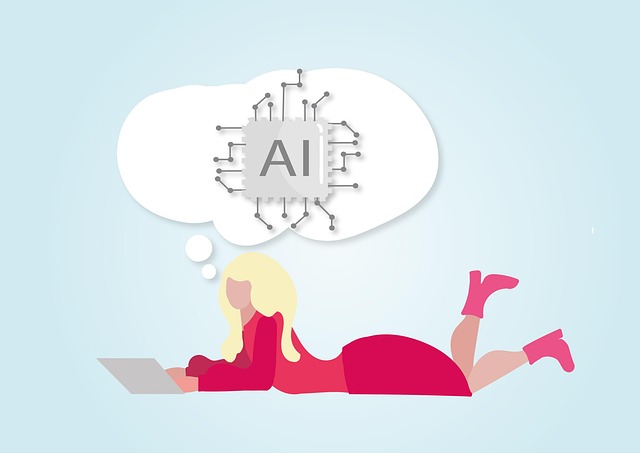AI chatbots and assistants are transforming business-customer interactions by providing personalized, efficient, and accessible customer service. Leveraging machine learning algorithms, these tools analyze vast data to anticipate needs, offer tailored recommendations, and handle tasks 24/7. This enhances satisfaction, fosters loyalty, and drives sales while freeing human agents to focus on higher-value work. However, challenges like data privacy and over-personalization must be addressed for ethical AI customer service integration.
In today’s digital landscape, customizing user journeys through AI personalization is pivotal for enhancing customer engagement. As AI chatbots and assistants gain traction, businesses are leveraging their capabilities to deliver tailored experiences. This article explores the transformative power of AI personalization in customer service, delving into strategies for effective implementation and dissecting its benefits and challenges. Additionally, it forecasts future trends, highlighting the profound impact of advanced AI customer service on business operations.
- Understanding AI Personalization: The Role of AI Chatbots and Assistants
- Enhancing Customer Service with AI-Driven Personalization
- Tailoring User Journeys: Strategies for Effective Implementation
- Benefits and Challenges of AI Personalization in Customer Engagement
- Future Trends: AI Customer Service and Its Impact on Business
Understanding AI Personalization: The Role of AI Chatbots and Assistants

AI personalization has transformed the way businesses interact with their customers, offering a tailored experience that was once unimaginable. At the forefront of this revolution are AI chatbots and assistants, which act as digital guides, tailoring user journeys based on individual preferences and behaviors. These intelligent systems utilize machine learning algorithms to analyze vast amounts of customer data, from browsing history to purchase patterns, enabling them to provide personalized recommendations and support.
AI chatbots and assistants enhance customer service by offering instant, 24/7 support, answering queries and resolving issues efficiently. They can understand natural language, engage in conversational interactions, and learn from each communication, improving their accuracy over time. This level of personalization not only improves customer satisfaction but also fosters a sense of loyalty, as customers feel understood and valued.
Enhancing Customer Service with AI-Driven Personalization

In today’s digital era, enhancing customer service through AI-driven personalization is revolutionizing how businesses interact with their clients. AI chatbots and assistants are no longer mere tools; they’ve become game changers in delivering tailored experiences. By leveraging machine learning algorithms, these intelligent systems can analyze vast amounts of customer data, understanding individual preferences and behaviors. This level of personalization enables companies to provide swift, accurate, and contextually relevant support, significantly improving satisfaction rates.
An AI-personalized customer service journey starts with anticipatory assistance. Chatbots can proactively offer solutions based on users’ historical interactions, predicting their needs even before they’re explicitly stated. Moreover, these assistants can handle a multitude of tasks, from answering frequently asked questions to escalating complex issues to human agents, ensuring every customer interaction is efficient and effective. This not only reduces response times but also allows human support staff to focus on more intricate, value-added responsibilities.
Tailoring User Journeys: Strategies for Effective Implementation

In the realm of digital experiences, tailoring user journeys has become paramount for businesses aiming to offer personalized interactions. AI chatbots and assistants play a pivotal role in this process by leveraging machine learning algorithms to understand user behavior and preferences. By analyzing data from previous interactions, these AI tools can anticipate users’ needs and deliver relevant content or assistance, enhancing the overall customer service experience.
Effective implementation involves strategies such as segmenting user bases for targeted personalization, using AI to create dynamic and adaptive journeys based on real-time inputs, and integrating feedback loops to continuously refine the journey map. Additionally, aligning AI customer service with brand values ensures that personalized interactions remain consistent and meaningful, fostering stronger user engagement and loyalty.
Benefits and Challenges of AI Personalization in Customer Engagement

AI personalization has transformed the way businesses engage with their customers, offering numerous benefits in creating tailored user journeys. By leveraging AI chatbots and assistants, companies can provide 24/7 customer service, instantly addressing client queries and delivering personalized recommendations based on their preferences and behavior. This level of customization enhances customer satisfaction, fosters loyalty, and drives sales by matching products or services to individual needs.
However, implementing AI personalization comes with challenges. Ensuring data privacy and security is paramount as handling vast amounts of customer information requires robust safeguards. Additionally, maintaining transparency in the use of AI technologies is crucial for building trust with users. There’s also the risk of over-personalization, where algorithms might perpetuate biases or create echo chambers, limiting diverse perspectives. Effective management of these challenges is essential to harness the full potential of AI customer service while delivering exceptional and ethical user experiences.
Future Trends: AI Customer Service and Its Impact on Business

As we move further into the digital age, AI chatbots and assistants are set to revolutionize AI customer service. These advanced technologies offer personalized experiences, understanding user needs with remarkable accuracy. By leveraging machine learning algorithms, they can anticipate future trends and preferences, allowing businesses to deliver proactive support. This evolution in AI customer service has a profound impact on operations, reducing response times and workload while enhancing customer satisfaction.
The integration of AI assistants into customer service workflows streamlines processes, enabling efficient handling of multiple queries simultaneously. This not only improves overall efficiency but also opens up opportunities for businesses to focus on more complex tasks, fostering deeper customer relationships. With AI at the helm, customer service becomes more accessible, available 24/7, and tailored to individual users, setting a new standard for excellence in the industry.
